Bernstein visits The Media School, discusses journalism in election landscape
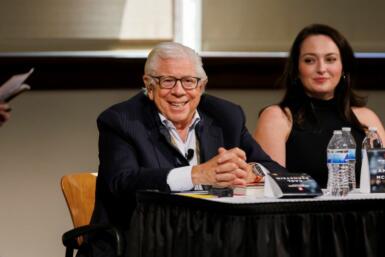
On Tuesday, more than 300 audience members filled Presidents Hall in Franklin Hall to listen to Poynter Chair and Roy W. Howard Journalist-in-Residence Carl Bernstein speak. Bernstein is a world-renowned journalist, famed for his partnership with Bob Woodard in investigating and reporting on the Watergate scandal that eventually led to former President Richard Nixon’s resignation.
Moderated by associate professor Suzannah Evans Comfort, the panel also included three guests: Mariana Alfaro, a reporter on the Washington Post’s breaking political news team; Media School Associate Dean for Academic Affairs Gerry Lanosga; and Amelia McClure, lawyer and director of the Hoosier State Press Association.
Dean David Tolchinsky welcomed the audience and kicked off a 90-minute conversation with questions Comfort had prepared concluding with questions from the audience.
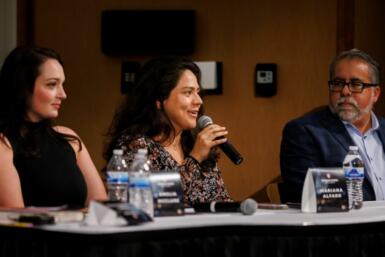
Comfort asked the panelists to help define the term “polarizing” for clarification, as the word was in the event title. After giving a brief definition, panelists touched on the history of polarization, specifically in the United States of America, and how journalists should react to it.
“I’m not at all sure that our job as journalists is to contradict or undermine polarization,” Bernstein said, in partial disagreement with his other panelists, specifically Lanosga. “Our job is [to find] the best-obtainable version of the truth through the kind of shoe-leather reporting.”
Lanosga had said previously that polarization was defined as extreme or radical views on either side of the political spectrum. Alfaro agreed and said that her job as a journalist was to meet people in the middle from either side, which Bernstein ultimately disagreed with. Bernstein said that several social movements – giving the examples of the gay rights movement, civil rights movement, and the first wave of feminism – were considered radical at the time.
“The idea that [journalists] have a responsibility to press to stake out some position to contradict polarization seems to me the opposite in some regards of what our role is,” Bernstein said.
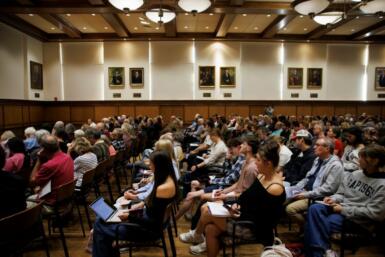
“It’s similar to this question that you raised, [that] the idea of centrism is somehow an admirable goal for us. I don’t think it’s an admirable goal for us anymore. Leftism or rightism, our job is the best obtainable version of the truth. After which, people can choose whatever side of the polarized culture they exist in.”
“I’d like to throw out the idea that this election is not only unique, [but] that today’s Republican party is unique,” Bernstein said. “It is the most radical political party that we have experienced in this century. If anyone would have told most of us in the last 25-30 years that the Republican party was going to occupy this radical space in our culture, I think there are few who would have ever predicted this.”
On the topic of hindsight, the panel also discussed the evolution of journalism and its relationship to technology largely focusing on Watergate to current times.
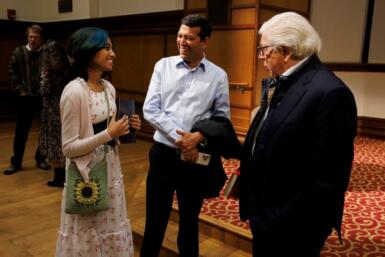
“If Woodward and I had had Google, we would have saved ourselves a hell of a lot of time looking up addresses and things like that, and we would have gotten out of the office faster,” Bernstein said. “That is what we ought to be looking at, including in journalism school, how to get out of the office faster and go knock on doors.”
The first question from the audience asked why a Republican should change their media source from Fox News when the panel had ‘only’ brought up examples and blamed Republicans for polarization, which, combined with the fact that Republicans had been described as radical, was a turnoff.
Bernstein rebutted, saying that there were issues on both sides, specifically regarding President Joe Biden and his mental decline. Bernstein was one of the first to report on Biden’s cognitive decline this summer, eventually leading to Biden dropping out of the presidential race.
Lanosga then focused on the validity of the question, both as a former journalist and as an academic.
“One of the things that I recall as a reporter – and I watch it now recently as a person who observes journalism – is that one very common critique of news media and reporters in general would be ‘That’s not something you’ll cover’ or ‘Oh, I bet the Star didn’t have that story.’ Then you dig into that, and find out that in actuality, they did do those stories. I don’t want to be overly defensive, because the failures of media are legion. So we can think about all sorts of things,” Lanosga said.
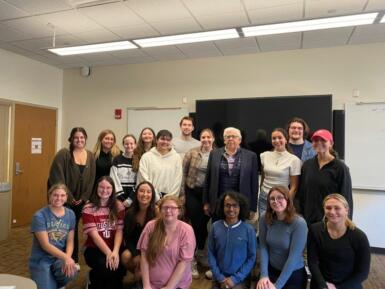
The discussion ended with the panelists offering advice for future journalists and providing insight into the future of journalism.
“We need more working-class reporters,” Bernstein said. “Look at our newsrooms. They are representative of the elites. We gotta get away from this. Because we need reporters who know something about the common experience of other kinds of people. And I don’t think we have them. Case closed.”
Bernstein will host another public discussion at IU in November in response to the election outcome and discuss its implications for journalists.

